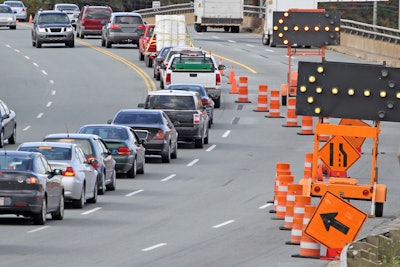
A week after ramming through a stopgap measure that extended highway funding past Thanksgiving, the House of Representatives Friday night passed a $1.2 trillion infrastructure bill that provides $110 billion for roads, highways and bridges, along with money for the buildout of an electric vehicle infrastructure, water projects, the expansion of high-speed internet service, environmental cleanup and public transit. It also creates a training and apprenticeship program for under-21 commercial drivers to haul interstate.
The measure passed narrowly (228-206) with 215 Democrats voting alongside 13 Republicans in favor of a 38% increase in road and bridge funding, "and an infusion of highly-trained, younger talent into our workforce," American Trucking Associations President and CEO Chris Spear said Friday night via emailed statement.
Truckload Carriers Association (TCA) also applauded the bill's passage, saying it "represents a significant investment in our nation’s roads and bridges and delivers a desperately needed injection into the Highway Trust Fund to keep it solvent. We are excited that this language provides an opportunity to expose a younger demographic to an industry that welcomes them..."
ATA and TCA have each been long-term supporters of legislation that would allow drivers under the age of 21 to drive interstate – removing the intrastate-only restriction – and see the outreach as one solution to fixing a driver shortage that, according to ATA, has reached 80,000.
Notably absent from the bill was any language regarding the union-friendly PRO Act, which trucking agencies had long-opposed as a threat to the industry's independent contractor business model.
NATSO, the trade association representing truck stops and travel plazas, noted that grant programs established by the Infrastructure Investment and Jobs Act encourage investments in a range of alternative fuels, including electricity, hydrogen, biofuels and natural gas, "by allowing for the benefits of innovation and technology development, which will give consumers options, all while competing for their business on price, speed, and quality of service."
NATSO President and CEO Lisa Mullings further applauded that the legislation was absent provisions that would have allowed states to compete with the private sector by installing electric vehicle charging stations at rest areas and that locations for alternative fueling must take into account the availability of amenities such as food and restrooms.
"We appreciate that Congress has ensured critical funding for America’s highways without tolling Interstate highways or commercializing rest areas," she said, "which would have discouraged the private sector from investing in electric vehicle charging and other emerging technologies.”
President Joe Biden said he will sign both bills into law.












